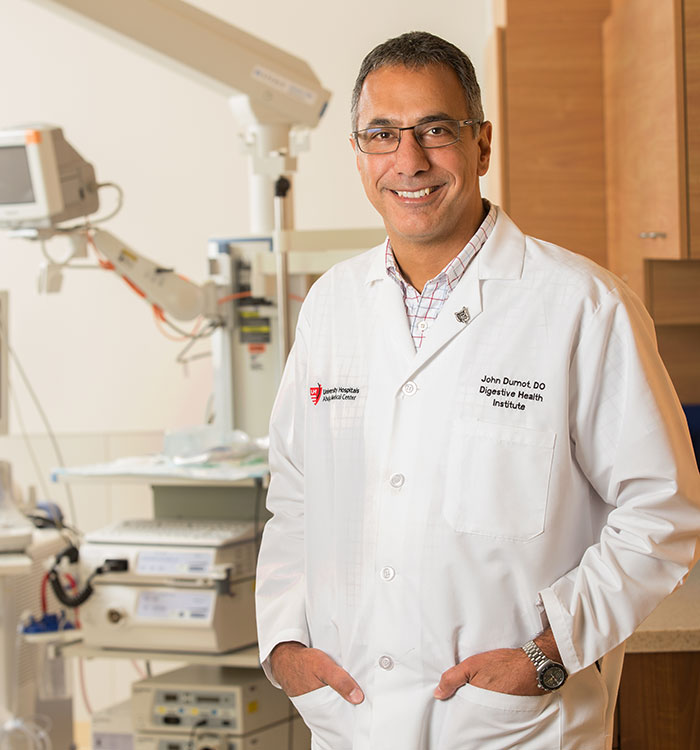Digestive Health Institute Update | Winter 2021
January 18, 2021
Screenings increase, offerings expand despite challenges of pandemic
Innovations in Digestive Health | Winter 2021
 John Dumot, DO
John Dumot, DOWhile COVID-19 continues to stress all Northeast Ohio health systems, patients still come to the University Hospitals Digestive Health Institute for debilitating gastrointestinal cancers and disease. Screening is as important now as ever.
To ensure patients receive the preventative care they need — even when they want or need to stay home — UH Digestive Health Institute immediately pivoted to offer the multitarget stool DNA test Cologuard and the Fecal Immunochemical Test (FIT) as a first line of screening. We can prescribe these tests during in-person and telehealth visits. When patients test positive with either FIT or Cologuard, we track the results to make sure they come in for a follow-up colonoscopy.
Following this process, we screened approximately 4,000 more patients in 2020 than in 2019 with Cologuard in the safety of their own home. We also found no decline in colonoscopy volume in the same period, and we believe there were more significant findings in average-risk patients inclusive of the positive Cologuard indication.
Helping more patients avoid preventable cancers is one silver lining that emerged from the pandemic. Another positive was our ability to offer innovative solutions for patients with chronic pancreatitis.
Surgical treatments for chronic pancreatitis include partial pancreatectomy for disease restricted to part of the pancreas and drainage of the pancreas into the intestine when the obstructed main pancreatic duct is dilated. When symptoms persist after these procedures, total pancreatectomy is often recommended. However, post-operative insulin-dependent type 3 diabetes is a common complication.
Islet autotransplantation, now offered at UH, helps mitigate this condition. As Jordan Winter, MD, Chief of Surgical Oncology at University Hospitals Cleveland Medical Center, explains, “Islet cells from the resected pancreas may be harvested and re-infused into the liver. To date we have successfully performed this operation in three patients with chronic pancreatitis.”
UH Digestive Health Institute has also made great strides in improving liver transplant outcomes. When transplant is required due to cirrhosis from chronic hepatitis C (HCV), reinfection often occurs after transplant. University Hospitals has improved clinical outcomes in these patients curing HCV as soon as one month after transplant.
U.S.NEWS & WORLD REPORT RANKINGS
Our ongoing commitment to improving outcomes and providing the highest quality of care possible allows University Hospitals Cleveland Medical Center to consistently remain a U.S. News & World Report “Best Hospital”. In 2020-2021, gastroenterology & GI surgery ranked #39, along with six other adult specialties, ranked in the Top 50 nationally.
That ranking puts us in the top one percent of hospitals nationwide. Yet, because we know how well we excel in outcomes, safety and processes of care, we think we can do better. I encourage our physician community to vote in this year’s reputational survey.
All board-certified physicians who were registered Doximity users by November 1, 2020, can vote online. Information about the survey should appear in your email Inbox in February or March. You can also watch for information on Doximity.com.
This year is already shaping up to test our resiliency. As a health system known for successfully treating a range of complex cases, we will continue to rise to the occasion.
To make a referral or for physician consultation with the UH Digestive Health Institute, call 216-553-1976.
John A. Dumot, DO is the Director, UH Digestive Health Institute and Professor of Medicine at Case Western Reserve University School of Medicine


